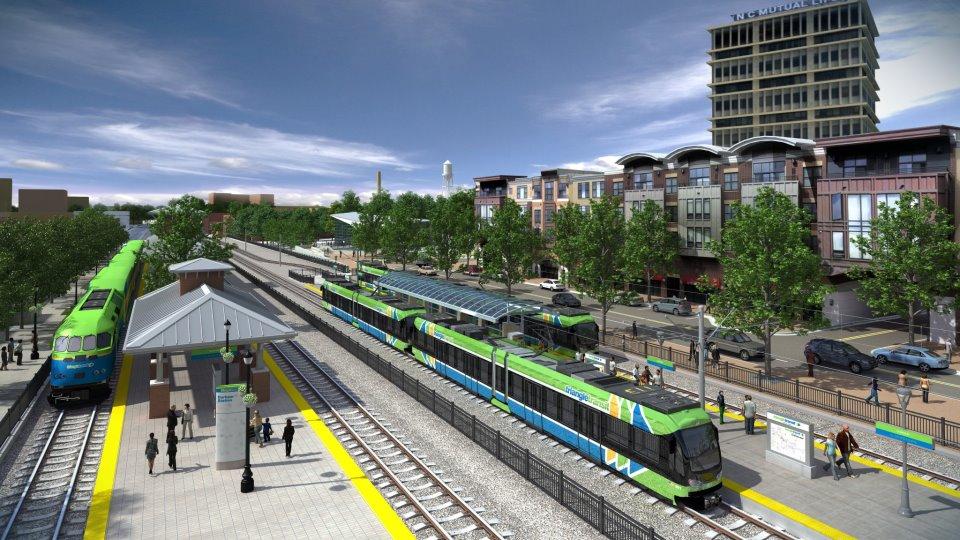Duke University has pulled the rug out from under a $3.3-billion light rail project that residents of Durham had spent a decade planning and had agreed to support with a new tax.
On the precipice of an important federal deadline, Duke announced on Wednesday that it would not sign an agreement granting the 17.7-mile Durham-Orange light rail project access to land owned by the university. The decision blocks planners from applying for $1.2 billion in federal construction funding that they almost certainly would have gotten.
In a letter [PDF], University top brass blamed the decision on concerns about impacts of the light rail line to its hospital from electromagnetic and electronic interference and construction vibration.
But GoTriangle, the agency advancing the project, says the concerns are just the latest in a six-year laundry list from Duke that project leaders have addressed. For example, the GoTriangle had committed to a $90-million elevated track in order to ease the university's concerns about electric power disruptions. In addition, the University wanted a $1-billion insurance policy to ensure that vibrations from passing trains did not affect research and diagnostic equipment. When GoTriangle complied, the University demanded a $2-billion insurance policy.
The announcement has sparked criticism of university leadership. Durham City Councilman Charlie Reece said university officials are out of touch with the needs of the community, especially lower-income residents.
4/ Recent reporting has revealed the extent to which Duke has apparently worked at every turn to thwart the light rail project, despite the best efforts of GoTriangle to meet Duke’s increasingly unreasonable demands.
— Charlie Reece (@CM_CharlieReece) February 28, 2019
6/ Duke’s decision to kill the light rail project sadly reinforces the worst fears of many Durham residents — that Duke University is an arrogant and elitist enclave with little interest in being the kind of partner this city needs.
/end
— Charlie Reece (@CM_CharlieReece) February 28, 2019
Another City Councilman, Mark-Anthony Middleton, echoed the "elitist" rhetoric in a statement to the News Observer, and urged the city to use eminent domain to acquire the needed land.
“How can the very economic trajectory of our region be determined by one wealthy, private landowner?" he asked.
The decision seemed to be made primarily be three university executives: Duke President Vincent Price, Executive Vice President Tallman Trask III, and Health Affairs Chancellor Eugene Washington were the only signatories on the letter to GoTriangle.
Some University faculty and staff have been outspoken as well. The Faculty Union demanded that University leadership continue the project. Earlier this week, more than two dozen faculty and staff signed a letter urging the University to grant the project access.
Duke climate scientist Drew Shindell told Streetsblog on Wednesday that the decision flies in the face of the University's stated concerns about climate change and about the health of the community.
GoTriangle estimated the project would support about 20,000 new jobs for the region and carry about 26,000 daily riders. It was to connect Duke University to Chapel Hill and the universities' affiliated hospitals, which are among the fast-growing region's largest employers. Voters approved a half-cent sales tax to support the project in 2012.
The community had been discussion how to develop affordable housing around the corridor. Starting the project over from scratch would delay it 10 to 15 years.
In a statement, GoTriangle said it would "work with the elected officials in Durham and Orange counties and the Federal Transit Administration to assess all available options and decide upon a course of action."
The project had already survived several assassination attempts by the state legislature.






